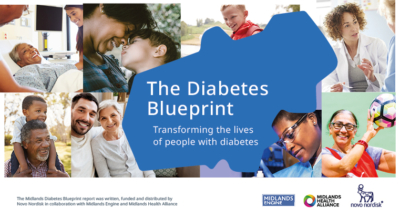- Improved diabetes control could result in significant productivity savings of £269.25m in Midlands
- 1 in 13 adults in Midlands has diabetes – the highest of any UK region
The Midlands Engine partnership and Midlands Health Alliance today (7 April) launched an innovative report developed with Novo Nordisk, regarding persisting health inequalities, and in particular the high rates of diabetes across the Midlands where one in thirteen adults has received a diagnosis, the highest of any region in England. This represents an urgent need in the region to improve diabetes cause and control, for both individual and economic wealth being: according to research from the Midlands Engine Observatory, improved diabetes control had the potential to create £269.25m of productivity savings in the Midlands
The Diabetes Blueprint has been written, funded and distributed by Novo Nordisk in collaboration with Midlands Engine and Midlands Health Alliance. This follows a virtual roundtable discussion held in July 2021 which brought together diabetes clinical experts and other Midlands Engine partners to explore the challenge diabetes poses to the health of the region’s population and economy, and how this might be addressed.
The Blueprint highlights the social and economic implications of existing health inequalities and the opportunity posed by tackling rates of type 2 diabetes, noting that:
- People with diabetes have a sickness absence rate 2–3 times greater than the general population
- A third of people who died in England’s hospitals during the early phase of the COVID-19 pandemic had diabetes
- People from ethnic minority backgrounds are up to six times more likely to develop type 2 diabetes
- Living with diabetes increases a person’s chances of exiting the labour force by 30%
- 80% of NHS spend on diabetes goes on treating potentially preventable complications associated with diabetes
In addition to detailing the impact that diabetes complications have, the Diabetes Blueprint offers a host of innovative and bold policy interventions designed to streamline and increase the efficacy of community-based health measures. The report’s recommendations include:
- Establishing regional research networks to create frameworks for implementing clinical research and using the insights from this to inform the development of clinical best practice
- Investing in regional and local research centres to allow patient populations to access the latest medical advances at the earliest opportunity
- Increasing efforts to identify specific risk factors within local populations that are potentially driving increases in rates of type 2 diabetes
- Developing robust processes to make sure healthcare professionals from a range of disciplines are able to support the care of people living with diabetes
- Working with community partners to ensure information and education is appropriate and accessible for people of minority ethnic backgrounds
The Blueprint also showcases some of the best examples of work being undertaken across the Midlands to improve outcomes for people living with diabetes and how this can support economic productivity and improved quality of life for communities. These activities include: a toolkit for toolkit for increasing participation of ethnic minority groups in health and care research, launched by the Centre for Ethnic Health Research in Leicester;; the University of Birmingham’s research to better understand the relationship between those living with type 2 diabetes and experiencing obstructive sleep apnoea; and the M3 research programme, led from the Leicester Diabetes Centre, which is actively working to engage younger people living with type 2 diabetes to help develop services for them.
Work is now being spearheaded by Midlands Engine Health partners to develop an implementation plan that will ensure the recommendations within the Diabetes Blueprint are acted on with urgency – as part of levelling up our region’s health and economy, and addressing long-standing health inequalities in the Midlands.
Sir John Peace Chairman of the Midlands Engine Partnership, said: “Coronavirus has reminded us all of the absolute value of good health and indeed, of the enduring and stark health inequalities experienced by too many communities. If we are to level up the economy, we must also level up health and this must be part of our work to rebuild and recover, post COVID-19. Here in the Midlands, a globally leading centre for health, MedTech and life sciences, innovative and ground-breaking research, care and workplace-based projects are being driven forward right now, as we work to reduce the impact of diabetes and support the wellbeing of people affected.”
Professor Melanie Davies, Co-Chair of the Midlands Health Alliance, said: “Given the high prevalence of diabetes in the region, the Midlands is an excellent place for research, and to run pilot programmes testing new approaches and innovative treatments. This Diabetes Blueprint is a great opportunity to highlight the fantastic work that is happening in the Midlands to address these important issues and to deliver those policy interventions which have the scope to be transformational for our communities and economy.”




